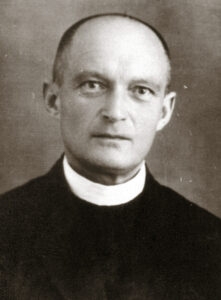He was born on 4 January 1905 in Bedrychiv (today’s Ukraine). In 1920, due to the Polish-Soviet War, the Bukowiński family moved to Cracow. There Władysław Bukowiński was ordained priest in Wawel Cathedral. Firstly he served as a priest in Rabka and Sucha Beskidzka, then he was transfered to Lutsk.
In September 1939 Lutsk got under the Soviet occupation. In August 1940 pr. Bukowiński was arrested by the NKVD and incarcerated in Lubart’s castle. In June 1941 he survived the prison massacre – during the execution he was not touched by any bullet and he was swamped with the bodies of the murdered inmates.
In January 1945 he was arrested by the Soviets, who took Volhynia again. Soon he was sentenced to 10 years in forced labour camps. He worked, among other, in logging the Ural forests in Chelyabinsk camps and in “Pokro” copper mine in Jezkazgan. Despite the hard work and sickness, which almost caused his death, he celebrated the mass every morning and after work he visited the sick.
In 1954 he was sent to Karaganda, where he had to find an employment – he became a night watcher in coal combine. During this period he was conducting a secret pastoral activity, celebrating masses in private apartaments. In 1955 he could return to Poland, but he gave up this opportunity and took a Soviet citizenship to be able to permanently serve as a priest in Kazakhstan. He resigned from the watcher’s job and focused only on priesthood. In 1959 he was sentenced for creating a church illegally and for religious agitation for three years of forced labour. He worked in logging near Irkutsk. He served people for another several dozen years. He died on December 3, 1974 in Karaganda in the opinion of sanctity. He was beatrified in September 11,2016 in Karaganda. He is called “the apostle of Kazakhstan”.




